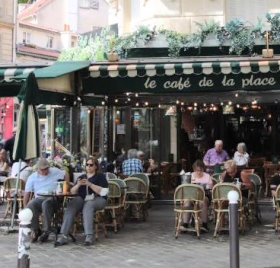Paris left bank walking tour. Walking tour map

The Paris left bank walking tour goes throught a very pleasant district. The Seine River, Luxembourg Gardens, Saint-Germain-des-Près and Saint-Sulpice churches, Hermès store are its highlights. Paris walking tour maps.
Left bank Paris walking tour
The left bank is the area in the left bank of the Seine river and the right bank the area in its right bank. You have 3 hours to spend in Paris left bank. We recommend you the following walk. Start from Louvre (marker 1 on map below). Cross the Seine river on Passerelle des Arts (2). Admire the French Academy and the art stores in Rue de Seine (3). You are now in Saint-Germain-des-Près district. See Place Furstenberg and Delacroix Museum. Stop at Place Saint-Germain-des-Près (4), Café de Flore or Deux Magots.

Café de Flore in Paris left bank
Paris left bank walking tour map
Walking map of Paris left bank pdf
Print Walking map of Paris left bank pdf and discover left bank walking.
Live left bank Paris
Do your shopping Rue Bonaparte (5) or Rue de Sèvres near by. Stop at Place Saint-Sulpice (6). Visit the church. Go to Luxembourg Gardens through Rue Férou (7). Finish at RER Luxembourg metro (8). Left Bank Paris map.
The left bank is attractive and you will have many occasions to turn left or right and spend the whole day. Take your time. Live the left bank, the most parisian district of Paris.

Place Furstenberg in Paris Left Bank
Stay in top Paris hotel

Favorite Left Bank hotel
Hotel Saint-Paul is conveniently located between La Sorbonne and Luxembourg Gardens in rue Monsieur-le-Prince, an old left bank street.
The hotel offers air-conditioned and soundproofed guest rooms with flat-screen TV and free Wi-Fi access. Guests can relax in the shared living area, with an open fireplace.The hotel serves a buffet breakfast in the 17th-century arched cellar. Room service offers a choice of hot drinks.
Paris 75006 France

Hotel Saint-Paul is near Luxembourg Gardens
Montparnasse in the left bank
Montparnasse district today, at the southern end of the Left Bank, is first of all a train station to Brittany and Bordeaux, the highest skyscraper in town, the Tour Montparnasse, a nightlife district, with cinemas, theaters, restaurants and bars, and a significant portion of Paris's history in early 20th century.
Few Parisians would easily define the boundaries of the district. Boulevard Montparnasse with its brasseries, rue de la Gaité with theaters, restaurants and bars are the core of the district. The catacombs are at the edge of it.

Café in Montparnasse
Top left bank restaurant
In between the Seine River and Saint-Germain-des-Prés in the left bank, Relais Louis XIII is housed in a 17th century house, featuring old stones, noble wooden beams, engravings, stained glass windows and antique chairs.
Very attached to traditional French cuisine, Manuel Martinez, the cook, revisits it and brings an elegant modernity to his classical dishes. The cook is obsessed with finding the truth in flavors, through a meticulous produce selection process. Great gastronomy. 80 euro signature menu at lunch time.
One of our favorites restaurants in town. We are regulars.
Paris 75006 France

Relais Louis XIII for revisited French gastronomy
Le Panthéon in left bank
Le Panthéon now functions as a secular mausoleum and houses among others the remains of Pierre and Marie Curie, the physicists who discovered radioactivity, Voltaire, Rousseau, Emile Zola and Victor Hugo, four famous French writers and philosophers. Jacques-Germain Soufflot, the architect of Le Panthéon, Jean Jaures and Leon Gambetta, two French political leaders, are also buried there. The first person to be buried there was Jean-Paul Marat, a French revolution leader. He was disinterred later as his sanguinary role during the revolution was reasessed.
Paris 75005 France

The crypt in Le Panthéon
The Sorbonne in left bank
Founded in the 12th century, the Sorbonne is one of the oldest and best universities in Europe. In 1971, in the aftermath of the 1968 riots, it was split into 13 universities, numbered from 1 to 13. A number of these universities retain the word Sorbonne as part of their name. Paris 1 and 4 occupy most of the original building of Sorbonne University in Quartier Latin near Le Pantheon in the left bank. 350 000 students study today at the university. Many of these universities are regrouping themselves into bigger multidisciplinary universities of wordlwide level. Paris Sorbonne University and Université Sorbonne Paris Cité are already prominent French universities. La Sorbonne facts.
Today, the university coexists with the typically French Grandes Ecoles, dominant in the fields of engineering (Ecole Polytechnique, Centrale, Mines and business administration HEC, Essec, ESCP).

Paris University: the famous Sorbonne Chapel